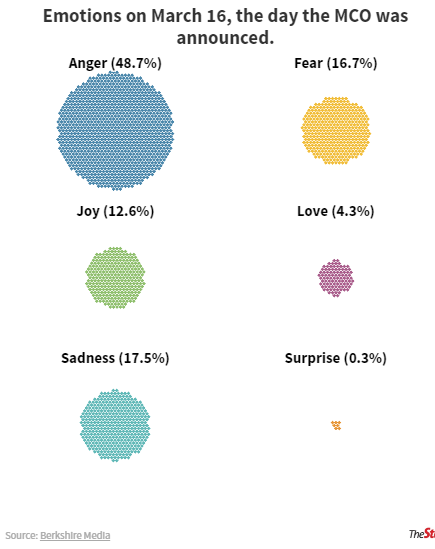PETALING JAYA — Malaysians, who have been confined to their homes since March 18, have shifted from mostly feeling angry and scared on the first day of the movement control order (MCO) to joyful but sad as the days progressed, according to a data analytics and digital media firm.
Berkshire Media, using a self-developed text analytics software, scoured 223,897 social media postings made by Malaysians from March 16-20 to listen to their sentiments, measure them and track for changes.
On March 16, the day the MCO was announced, the firm found that 48.7% of netizen’s social media posts expressed anger towards the overall Covid-19 situation, with 17.5% feeling sad and 16.7% fearful.
Four days later on March 20, 46.5% of the postings on social media were more light-hearted and optimistic that the MCO, though strict, could help to flatten the curve of rising infections.
However, 25.5% were still in low spirits and 16.1% fearful.
“In the case of Covid-19, positive content and comments by netizens on social media recorded an increase – perhaps due to stress-coping mechanism after prolonged exposure to emotionally negative content which had caused anxiety,” said founder of Berkshire Media Shahid Shayaa.
“This is one of the key behavioral changes we found in our research,” he said.
The MCO, which started on March 18 but has been extended twice until April 28, imposes strict social distancing measures with Malaysians urged to mostly stay at home in order to stem Covid-19.
The tool, which Berkshire used, analyzed words contained in social media postings in both Bahasa Malaysia and English that described six primary emotions.
Words such as “good job” and “tenang” (calm) were measured as joy, while others such as “trauma”, “panic” and “seram” (scared) were used to measure fear.
Four other primary emotions measured were sadness, anger, love and surprise.
The report found that job uncertainties, fear of not being able to buy essential goods and food supply disruptions were among the main reason for the fear and anger which many initially expressed.
However, as Malaysians began adjusting and adapting to the MCO’s rules, more optimism was observed due to greater acknowledgement that the stringent measures introduced could help reduce the number of Covid-19 cases in the country.
As Malaysians began to preoccupy their time with activities at home such as cooking and spending quality time with their families, the circulation of humorous content on social media also helped to contribute to the overall feeling of joy and decrease in fear and anger from the fifth day, the study found.
However, those on social media were also disheartened when the number of reported Covid-19 cases and deaths continued to rise, and as the burden faced by frontliners increased.
“Our study allows a snapshot into the range of feelings and coping mechanisms as a result of the MCO,” said Shahid.
“A more detailed and prolonged study will provide insights into human behavior in coping with anxiety and depression during the global pandemic.”
While the MCO is scheduled to end April 28, there is uncertainty over a further extension.
The director of the data analytics firm warned that anxiety and depression could build up the longer the MCO continues.
“If anxiety and low mood increases over time during the MCO, it will interfere with people’s ability to carry out daily activities such as completing work tasks, self-care and caring for children.
“We must be alert to this risk and start to proactively address it,” he said.
